QUICK READS
Below, you can find downloadable PDF fact sheets or ‘quick reads’ about hearing voices that summarise some of the key topics covered by Understanding Voices.
EXPLORING VOICES:
What is hearing voices?
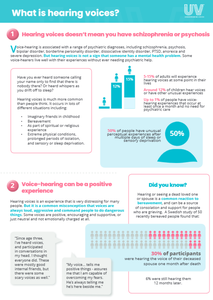 Voice-hearing is associated with a range of psychiatric diagnoses, including schizophrenia, psychosis, bipolar disorder, borderline personality disorder, dissociative identity disorder, PTSD, anorexia and severe depression. But hearing voices is not a sign that someone has a mental health problem. Some voice-hearers live well with their experiences without ever needing psychiatric help.
Voice-hearing is associated with a range of psychiatric diagnoses, including schizophrenia, psychosis, bipolar disorder, borderline personality disorder, dissociative identity disorder, PTSD, anorexia and severe depression. But hearing voices is not a sign that someone has a mental health problem. Some voice-hearers live well with their experiences without ever needing psychiatric help.
To learn more about this experience, download the ‘What is hearing voices?’ PDF here.
A spectrum of experience
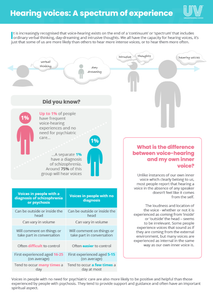 It is increasingly recognised that voice-hearing exists on the end of a ‘continuum’ or ‘spectrum’ that includes ordinary verbal thinking, day-dreaming and intrusive thoughts. We all have the capacity for hearing voices, it’s just that some of us are more likely than others to hear more intense voices, or to hear them more often.
It is increasingly recognised that voice-hearing exists on the end of a ‘continuum’ or ‘spectrum’ that includes ordinary verbal thinking, day-dreaming and intrusive thoughts. We all have the capacity for hearing voices, it’s just that some of us are more likely than others to hear more intense voices, or to hear them more often.
To learn more about this, and why voice-hearing is distressing for some and not for others, download the ‘A spectrum of experience’ PDF here.
Why do people hear voices?
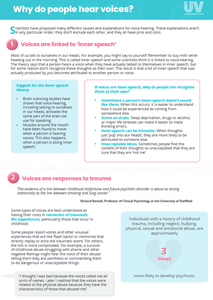 Scientists have proposed many different causes and explanations for voice-hearing. These explanations aren’t in any particular order, they don’t exclude each other, and they all have pros and cons.
Scientists have proposed many different causes and explanations for voice-hearing. These explanations aren’t in any particular order, they don’t exclude each other, and they all have pros and cons.
To read about some of these theories, download the ‘Why do people hear voices’ PDF here.
LIVING WITH VOICES:
Coping with voices
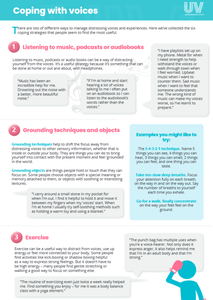 There are lots of different ways to manage distressing voices and experiences. Here, we’ve collected the six coping strategies that people seem to find the most useful
There are lots of different ways to manage distressing voices and experiences. Here, we’ve collected the six coping strategies that people seem to find the most useful
To learn more about these strategies, download the ‘Coping with voices’ PDF here.
Talking about voices: Suggestions for voice-hearers
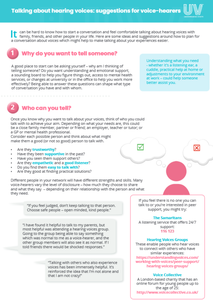 It can be hard to know how to start a conversation and feel comfortable talking about hearing voices with family, friends, and other people in your life.
It can be hard to know how to start a conversation and feel comfortable talking about hearing voices with family, friends, and other people in your life.
For some ideas and suggestions around how to plan for a conversation about voices, download the ‘Talking about voices: Suggestions for voice-hearers’ here.
Talking about voices: Suggestions for supporters
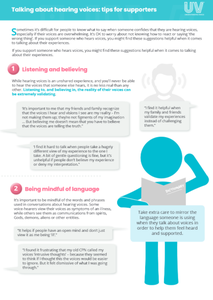 Sometimes it’s difficult for people to know what to say when someone confides that they are hearing voices, especially if their voices are overwhelming. It’s OK to worry about not knowing how to react or saying ‘the wrong thing’. If you support someone who hears voices, you might find these suggestions helpful when it comes to talking about their experiences.
Sometimes it’s difficult for people to know what to say when someone confides that they are hearing voices, especially if their voices are overwhelming. It’s OK to worry about not knowing how to react or saying ‘the wrong thing’. If you support someone who hears voices, you might find these suggestions helpful when it comes to talking about their experiences.
If you support someone who hears voices, you can find some helpful suggestions for talking about their experiences in our ‘Talking about voices: Suggestions for supporters’ PDF here.
WORKING WITH VOICES:
Talking therapies
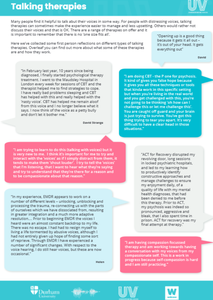 Many people find it helpful to talk abut their voices in some way. For people with distressing voices, talking therapies can sometimes make the experience easier to manage and less upsetting. Others would rather not discuss their voices and that is OK. There are a range of therapies on offer and it is important to remember that there is no ‘one size fits all’.
Many people find it helpful to talk abut their voices in some way. For people with distressing voices, talking therapies can sometimes make the experience easier to manage and less upsetting. Others would rather not discuss their voices and that is OK. There are a range of therapies on offer and it is important to remember that there is no ‘one size fits all’.
For some first person reflections on different types of talking therapies, and information about what they are and how they work, download the ‘Talking therapies’ PDF here.
